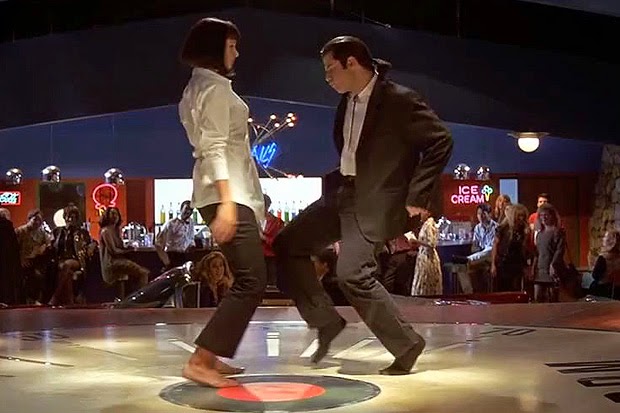One of the unfortunate things I’ve run into from reading tons of amateur screenplays is that screenwriters rarely practice specific skills. Their only practice comes from writing entire scripts and while that’s better than not writing anything, it doesn’t improve the dozens of specific skills you need in order to become a master screenwriter.
When I used to teach tennis, I didn’t just hit balls back and forth with my students and say “Good luck” in their next tournament. We identified specific weaknesss and then drilled those weaknesss. If a player’s backhand sucked, I wouldn’t let him leave the court until he made 50 backhands in a row. If they were double-faulting in their last match, we’d spend an entire lesson hitting second serves.
Writing isn’t any different. If you suck at suspense, you need to practice writing suspenseful scenes. You’re not going to magically get better through writing a bunch of screenplays. You need to target the problem.
One of the best ways to do this is through writing scenes and short scripts. Whatever you’re lousy at, pick a scenario, write a short about it, and practice that weakness. That’s what I want to do with this practice series. Give you a common weak point in amateur writing and have you guys write a scene practicing it. You can link to your scene in the comments and the user who gets the most up-votes wins. Not sure what they win yet, but we can come up with something. If you guys like this series, we’ll continue it. If not, it will go the way of the Sunday Obscure Movie Recommendation.
We’re going to start off big. One of the most egregious mistakes I see amateur screenwriters make is on-the-nose dialogue. This just came up in a script I consulted on two weeks ago (actually, if I’m being honest, it comes up in 70% of the scripts I consult on). The writer had written a funeral scene. And at the wake, the mother and son talked about how much they loved the dead father, how important he was to their lives, the wonderful things he had done in life, how they were upset he didn’t keep in better shape, because maybe then he wouldn’t have died. It was ON THE NOSE to the max.
On-the-nose dialogue is two things. It’s characters saying exactly what they feel. And it’s characters saying what’s already obvious. We’re at a funeral where dad just died. We don’t need three pages of dialogue where mom and son talk about how sad they are that dad died. We already know that because we’re at a funeral and the characters look sad!
So one of the best ways to cure on-the-nose sickness, is with something I call “off-the-nose” dialogue. To practice this, set up an extreme emotional situation. Maybe it’s a funeral. Maybe it’s a break-up. Maybe it’s a promotion. Then write dialogue where the characters are allowed to talk about anything BUT their feelings OR what happened. What you’ll find is that your dialogue comes alive.
So let’s go back to that funeral scene. Instead of the son saying, “Man, I’m so bummed that dad is dead,” have him say, “What’s for dinner tonight?” And go from there. One of the most powerful things you can do in dialogue is to play AGAINST the emotion. So if someone’s died, have your characters joking around. If someone just won the 180 million Powerball, have him complain that now he has to get a new place and he hates the stress of moving.
Now I’m aware that in some cases, your characters WILL say what they’re thinking. And even sometimes in off-the-nose dialogue, you’ll allude to what happened (as our Powerball winner just did with his comment). This isn’t a black and white thing. It has some grey area. But overall, dialogue works best when you stay away from the obvious. And that’s what today’s practice series is about. So remember: Don’t allow the characters to discuss what they’re feeling and don’t allow them to comment on what’s already obvious.
Best short script and/or scene wins. Upvote your faves! Good luck!
Genre: Comedy/Satire
Premise: A mother in the midst of an extended mid-life crisis tries to keep her family together, which is falling apart along with her.
About: Where’d You Go, Bernadette is a novel by Maria Keogh Semple, who has an interesting backstory. Born into the craziness that was Hollywood, her father was a screenwriter who wrote the pilot for the original Batman TV show. Maria would follow in his footsteps, growing up to be a screenwriter first, writing on the original Beverly Hills 90210, Saturday Night Live, and Arrested Development. “Bernadette” is her second novel and was a breakaway bestseller, due to its weird formatting of following the story in e-mails and texts. The script is being adapted by Fault in Our Stars writers Scott Neustadter and Michael H. Weber.
Writers: Scott Neustadter & Michael H. Weber (based on the novel by Maria Semple)
Details: 139 pages (2nd draft)
I get it. Not all of you have the time to read scripts. And if you’ve got a choice between reading and writing, you should be writing anyway. BUT, even if you’re not a vociferous reader, there are certain screenwriters who, when a new script of theirs drops, you need to read it. Sorkin is the big one. Tarantino. Christopher McQuarrie.
And believe it or not, Neustadter and Weber are racing up that list. Not only can they turn cancer into hundreds of millions of dollars, but even comedy A-listers like Seth Rogen and James Franco are courting them (for their adaptation of “The Room”). Where’d You Go, Bernadette, though, is their biggest challenge by far. How does one adapt a novel written in e-mails, memos and transcripts?
40-something Bernadette Branch is… different. An isolationist, her only contact with the outside world comes when she picks her daughter, Bee, up from school every day. And even that’s a chore since it requires her to mingle with other mothers, such as her nemesis, Audrey Griffin, and Audrey’s no. 1, the deceptively sneaky Soo-Lin.
The one source of pride in Bernadette’s life, besides her daughter, is her husband, Elgin, a computer genius who’s on the verge of syncing computers up with the human brain. When the three are having dinner at their strangely dilapidated mansion, Bernadette couldn’t be happier.
Unfortunately, a new wrinkle has entered her life. A long-forgotten promise she made to her daughter has resulted in her having to commit to a cruise to Antarctica. Since Bernadette can barely handle going down to the corner store, a trip to Antarctica will probably tear her open from the inside-out.
So Bernadette turns to her secret weapon, a virtual assistant in India she communicates with on e-mail. This assistant does all the anxiety-inducing tasks Bernadette must deal with on a daily basis – such as order food – and now she’s going to need her to plan her entire Antarctica cruise so Bernadette doesn’t experience death-by-icicle.
Through a strange coincidence, Audrey’s right-hand girl, Soo-Lin, who works at Elgin’s company, has just been promoted to his assistant. The two become friendly and Soo-Lin makes Elgin aware that his wife is borderline koo-koo. And if he doesn’t do something to save her soon, Bernadette may not be able to handle the stresses of life much longer.

I’m not sure what to make of this one guys. It’s soooooo weird. I’ve come up with two possibilities. One, this is one of those books someone writes to show how “literary” they are. Write a bunch of weird shit in weird ways and who cares if it makes sense. It’ll impress the critics and that’s all that matters.
The second possibility is that Semple was drunk. I’m talking legitimately wasted. And since she’s talented, she sort of makes it work. But she must have missed the second half of Hemingway’s famous mantra: “Write drunk. Edit sober.” Cause I’m pretty sure she edited this drunk as well.
I’m bringing up Semple and not Neustadter and Weber because this is her beast. Neustadter and Weber are simply trying to reign it in. And how do you reign something in that has no story? Yesterday we were talking about giving your script a clear goal. We definitely don’t have that here. The only plot point we keep revisiting is the Antarctica stuff. And since it doesn’t have any stakes (or even relevance) attached to it, it’s not driving the narrative forward.
I can see why they hired Neustadter and Weber. These are the guys who made the weird time-jumping narrative “500 Days of Summer” work. You figure if anyone can piece e-mails into scenes, it would be these two. But they seem downright confused by this book.
First of all, the one narrative thread that might save this script is the mystery: What happened to Bernadette? Where is she? But we don’t get to Bernadette missing until there’s 30 minutes left in the film. I don’t know many movies where you save your major narrative engine for the final act. Why wouldn’t you put it at the beginning, then back up flashback style, before rejoining the mystery later?
Maybe Neustadter and Weber are trying to be cute? Seeing how far they can bend the rules of storytelling? I don’t know. But this is a script with multiple character voice overs, some of which are audio flash-forwards discussing the past. We’re doing full-on origin story flashbacks here. Bee occasionally narrates. The lone story-carrot dangling in front of us is an Antarctic cruise. I mean this adaptation has all the makings of screenwriting seppuku.
And even if you get through that, you still have to conquer the razor-thin tone. This is a movie that wants you to laugh (a mulberry-driven mudslide that ruins your villain’s party) but also acknowledges super heavy shit, like bi-polar depression and multiple miscarriages. Am I supposed to cry? Laugh?? I have no idea!!
I see this going one of two ways. As a showcase for some amazing female actress, likely a Sandra Bullock or Julia Roberts type. If they nail the part, the movie markets itself as an acting tour-de-force. Or it could become the next “Butter.” For those who have forgotten, Butter won the Nicholl Fellowship, finished high on the Black List, and was similar to Bernadette in a lot of ways. A satire on conservative families based around a series of ludicrous ideas (A butter-carving contest). Both properties are so execution dependent that one wrong move dooms them. And Butter clearly landed on the wrong side of the expiration date.
But I will say this: At the very least, Bernadette is original. There’s nothing else like this out there and we need that. We can’t live solely on a diet of super-heroes and biopics. We need some variety and this project has it. Unfortunately, the darn thing varietied itself into variety purgatory. We’ll have to see if this dynamic writing duo can save it in future drafts. But for this draft, there were too many faults in its stars.
[ ] what the hell did I just read?
[x] wasn’t for me
[ ] worth the read
[ ] impressive
[ ] genius
What I learned: Don’t wait to reveal your story’s big selling point until the last act (here, we’re referring to the mystery of where Bernadette disappeared to). Try to get that plot point into the story as soon as possible. You may not be able to do that in a linear way, but you have other options. For example, you could’ve started this movie out telling us Bernadette was missing, and then jumped back in time to give us the events that led up to that problem.
Genre: Comedy
Premise: In the near future, a group of astronauts on an extended mission run into another ship with an all-female crew. Having not seen women in over five years, the astronauts can’t keep their sexual urges in check, leading to all sorts of shenanigans.
About: This script just sold (or came together as a package) last week. This is going to be a big one, as it stars what might end up being the greatest onscreen comedy trio of all time: Seth Rogen, Zack Galifianakis, and Bill Hader. It’s written by Rodney Rothman, who wrote 22 Jump Street, Grudge Match, and a ton of TV, dating back to his time as a head writer on the Late Show with David Letterman. The film seems to be greenlighted off of the recent huge success of other space-related movies in the marketplace (Force Awakens, The Martian, Gravity). Bringing a comedy angle to this niche only seemed natural.
Writer: Rodney Rothman
Details: 115 pages – undated
So the other day, I was giving notes on a comedy through my consultation service, and it was really frustrating. Because the writer was good. I mean he had such a grasp on his characters. They were all different from one another, they were funny, they popped off the page. The problem was that the story was all over the place. The goals kept changing and each successive change was less interesting than the previous one. All of this led to a choppy reading experience.
Now yesterday we were talking about Spotlight. Despite my issues with the character development in the script, the plot is beautifully simple and easy to follow: GET THE EVIDENCE that exposes widespread sexual abuse in the church and then write the article about it. That’s it. There’s never a moment in Spotlight where you don’t know what’s going on. The goal is always clear.
As much as I thought that character development is what’s keeping amateurs out of the big leagues, I’m realizing that a lot of you are still having problems with plotting, structure, and story. And that needs to be sorted out before the character stuff because Hollywood expects structure to be a given. If you can’t do that, you need someone to help you figure it out. Cause no studio execs I know buy wandering stories that get less interesting as they go on.
There are basically two approaches to structure. There’s the Spotlight approach, where you set up the big goal in the first act and everything going forward serves that goal. Or there’s the “changing goals” approach, where goals are achieved in the script and then new goals replace them.
The reason the “changing goals” approach is tricky is because it requires an extra skill – each time a new goal is introduced, it must be bigger than the previous one. Because think about it. If your hero is going after, say, the Ark of the Covenant. And they get it on page 30. And then you give us a new goal, where your hero is trying to get $2000 to make his rent that month, the audience isn’t going to go along with you. You just had the biggest artifact in the world driving your story and now you want us to care about rent?
As long as you understand the challenge that comes with this new variable, you should be okay writing a “changing-goals” script. Which is something Rothman does with today’s script, The Something. Hopefully, we can learn from him.
The Something jumps right into its story (always preferred), as we observe our soon-to-be-astronauts during their astronaut interview process. There’s McMurphy, our hero, who’s got a Bill-Murray like “who gives a shit” quality to him. There’s Bozark, who’s way too enthusiastic about even the most mundane things. There’s Stirrup, an anti-Boy Scout who’s had a self-imposed bumpy life, and finally Wingate, our arrogant soon-to-be Captain.
After a quick training session, the group is sent a trillion miles away to mine a potent energy source from asteroids. Originally promised that this would be a 2-year trip, they’re now on year 5 and nowhere near their mandated quota to return to earth. Needless to say, everyone wants to kill each other, and if there isn’t a miracle within like, two days, that’s exactly what’s going to happen.
Luckily, there is a miracle. Another ship! The group goes crazy and manages the get onto this ship, and as if God himself were looking down on them, it turns out the ship has an all-female crew. Well, “all-female” is a little misleading. There’s the hot Captain, Cordelia, the girl-next-door, Olivia, and finally “Sister,” the “2001”-like female computer on the ship.
It turns out the women have been pretty desperate for male company so the next thing you know, the two crews are having an all-night party. Still, something seems off about the whole thing. And later, our drunk crew wanders into a secret bay where they find out the women are transporting an alien!
Curious (and drunk), the guys release it, and that’s when everything goes to hell. The alien starts anally mating with people, multiplying, and threatening to kill all of them if they don’t do something drastic. When the others are compromised, it will be up to McMurphy to save the day. But since McMurphy has just put a premium on his relationship with Olivia, his priorities might prevent him from doing so.

From a comedy standpoint, I didn’t really dig this. It’s just not my style. Unlike Lucas and Moore, who seem a little sharper with their comedy, Rogen’s crew likes to keep it low-brow. And there’s nothing wrong with that. Different people think different stuff is funny. But when your pivotal climax moment includes a ten-second fart… I don’t know. I just feel like you can do better.
But whatever. The comedy is what it is and these actors are hilarious so I’m sure they’ll make it work.
Today, I wanted to talk about that structure, specifically how Rothman uses the changing-goals approach to frame his story.
The first goal driving things is mining the asteroid juice. It’s small but you have to start small on a goal-changing script if you want to build. After the crew goes insane, McMurphy’s goal is to get the ship back to earth. That’s all he cares about. Still small, but slightly bigger than the previous goal.
Next is the arrival of the mystery ship. McMurphy’s goal is to get on that ship. They’re not allowed to make contact with AAA ships, so McMurphy has to sabotage his ship to con their way onto there. Once they get on the ship, there’s a new goal. Get laid.
Now, the get laid goal may seem like a step back. It’s not as big of a goal as “getting home.” However, one of the cool things about comedy is that as long as you have a funny situation that you’ve SET UP and that the audience WANTS TO SEE, you can deviate from big goals momentarily.
We’ve spent the last 30 minutes showing how horny and desperate these guys are. So naturally, when they have access to women, we’re going to want to see what happens.
Finally, during the party, they find the alien, who gets loose, which gives us our final goal – and the goal that has the biggest stakes of all – kill the alien. This is what drives the remainder of the story (roughly the last 60 pages).
And that’s how you structure. You either do it like Spotlight, where you establish a giant goal for the characters right away, then ride it out, showing all the obstacles they face until they succeed/fail. Or you do it like The Something, where you start with a small goal and then build to bigger goals as the circumstances of the story change.
The second way is harder. So if you’re a new writer, I’d suggest going the Spotlight route. But if you tried the single-goal route and it feels restrictive, this route allows you to create a story with a little more variety.
I wish I liked the comedy as much as the structure here, but alas, The Something and its 10-second farts were too much for me.
[ ] what the hell did I just read?
[x] wasn’t for me
[ ] worth the read
[ ] impressive
[ ] genius
What I learned: In a comedy script, interview scenes are gold. They’re just inherently funny. From trying to get a job (Stepbrothers, Tootsie) to trying to get a date (40 Year Old Virgin). Any sort of interview-like scenario is easy to draw laughs from. Don’t believe me? Go write one right now. I GUARANTEE it will be funny!
Guys, I got nothing. I’m recovering from a Super Bowl food coma. But that’s not the worst of it. I’m also suffering from a The Last Witch Hunter coma. I unfortunately rented the film, and I’m more hungover from watching 30 minutes of that thing than my first Freshman year of college party, where I drank half a bottle of whiskey.
The thing that kept going through my head while watching this movie was, “Writers actually got paid to write this.” It flies in the face of everything I teach on this site – that you have to write something great to get noticed, to break through. Well, all those writers have to do is point to this movie and say, “No you don’t.” I mean I thought we’d reached the point where when someone writes the old “Bugs fly out of the mouth” scene, that that spec or those writers were automatically suspended by the WGA for the next five years. Or, even if you managed to survive that, that lines like, “You’re too late Witch Hunter,” would be the nail in the coffin. I guess not. At least it has, “You Know Nothing John Snow” Girl in it.
On a more upbeat note, I finally watched Spotlight. You may remember me hating this script. And while the movie was better than the screenplay, I’m still shocked by it. This is the only film I’ve seen since I can’t remember when where zero attempt – absolutely NOTHING – was put into character development.
We didn’t get to know the characters’ backstory, their personal lives, their relationships with one another. It was the oddest thing I’ve ever seen, particularly for an awards-seeking film. And after doing some research, it seems like this was the plan. They wanted the focus purely on the investigation as they felt if they dug into the characters, it would distract from that aspect. I still don’t know what to make of it because the material they’re working with is so good that you’re still invested. But if they’d put 1% effort into building these characters up, this would’ve been a much better movie.
Finally, the 2016 movie season officially starts next weekend! Can you believe it? Movies worth seeing in early February!! We get Deadpool, which looks awesome, AND Zoolander 2, which you know is going to have some big laughs. As someone who hasn’t had a reason to go to the theater since Force Awakens, I welcome this development. Are you team Deadpool or Team Zoolander?
And let me just throw this out there before I go. How come everyone in Deadpool looks so good, and yet everyone in X-Men (its sister-film, which just came out with a new trailer) looks so bad? Is it just me or is the make-up person who does X-Men the worst make-up person in Hollywood? Just the color of that blue Jennifer Lawrence character makes me nauseous. And all the other costumes look sooooooooo cheesy. Am I the only person who thinks this?
Finally finally, what was your favorite Super Bowl trailer??? Which of those films do you want to see the most? Civil War and Bourne for my money.
Today we’re going to do something different. There have been lots of writers submitting their scripts for Amateur Offerings but for reasons you’ll see in a moment, their scripts didn’t make the cut. The more I thought about this, the more I realized tons of writers go on making these same submission mistakes wherever they go, and no one ever tells them why their script or query is rejected. Therefore, they never get better and eventually give up. I want to change that today. I’d love it if you guys could explain to these writers why their submissions aren’t getting any traction. I’m hoping for a helpful and encouraging vibe, not an “Oh my God, you’re an idiot” vibe. Despite that, we’ll still be voting. I plan to review the winner next week. And who knows? Maybe I’ll be wrong and one of these scripts will be awesome. That would make my week. Good luck! :)
Remember, you can submit your own script to challenge your peers by sending me an e-mail (carsonreeves3@gmail.com) with your TITLE, GENRE, LOGLINE, WHY YOU THINK IT DESERVES A SHOT, and a PDF of the screenplay. A good review tends to get writers some industry contacts. So who knows, maybe you’ll be the next “The Last Alchemist.” Keep’em coming!
Title: Kill easy
genre: serial killer, thriller
logline: a teenage girl whose parents are murdered is going on the road to kill serial killers, retaliating for her lost childhood getting help from another serial killer, finding out this comes with prices to get payed.
wysr: I was reading in the book of blake snyder about the importance of killer titles and killer hooks. It inspired me to write a story about killing, changing the perspective and let the ‘victim’ do the bad things. I followed the blake snyder beat sheet to the letter just to see if it works for me. I liked writing this very much and I hope you like it as well. Sorry for my misspellings, I did my best.
I consider myself as a close to semi pro writer considering the fact that an other screenplay I wrote now is being finished to go into production in my country. Unclear is if it will be really happening. I ‘m a regular visitor of this site since a couple of months and have learned mega. Wishing you all the best and keep writing.
Title: Ski Furious
Genre: Action & Adventure
Logline: Female FBI agent rookie Ryan Coolridge infiltrates the world of extreme skiing looking for a group of skiers pulling off truck robberies on mountain roads.
Why you should read: This script I wrote over the weekend so it’s super fresh. Now that either means it’s terrible, genius or has promise. You can download and decide. The logline looks familiar – think The Fast and The Furious and Point Break but I throw in some twists and turns. I hope I make to Amateur Friday!
Title: Untitled Sci-Fi
Genre: Sci-Fi
Logline: A cold, orders first soldier is sent with a team into the quarantined city of Chicago to retrieve his estranged sister who may have found a cure for the VAIL, an alien virus that destroyed Chicago and turned its inhabitants into vicious monsters.
Why: In your review of “Unmanned” you talked about searching for a sci-fi that got to the premise, put a spin on the genre, and was willing to take chances — here you go. As for me, regular reader of the site, student of writing for many years. This is my culmination of several scripts, learning from a few different teachers, and failing, a lot. You want original, engaging sci-fi, this is your chance to get exactly that. Also, getting an idea for a title would be pretty f**king cool, too.
Title: Nuclear Solution
Genre: I’d describe it as ‘Light-hearted action’, but since that’s not a real genre, you decide.
Logline: After absolutely ruining the job they were hired to do, the protagonists have to tie up a loose end to avoid getting the blame for it.
Something interesting: Well, this is my third screenplay. Hope it’s not too amateur-ish for you. I put a lot of work into it, and I’ve gotten good reviews from people I know. So I’m hesitant, I really wanna know what someone who doesn’t know me and won’t act nice to me would think of it.
Title: MINDER
Genre: Dramatic psychological thriller.
Logline: After a traumatic experience places them together, a young woman, fearful of large dogs, agrees to watch a stranger’s aged dog. When she tries to find the stranger to give it back, her search becomes a dangerous and heartbreaking journey of self-discovery.
WYSR: I lost a pet recently. I went to a local pound to maybe adopt another. They say don’t look the dogs in the eyes at first. They may take it as a threat. Just stand close, let them feel you out. If the body language appears relaxed, then meet eyes with them. But it’s almost impossible. We communicate so much by meeting eyes. I could not do it. Besides, the looks from the dogs, one after the other, resigned to their fate, checked out totally or gone looney. So little hope. It was just overwhelming. So, I gravitated to those dogs who were blind. Found comfort in them.
And that day, with that experience, this story came to me.
It’s short for the time crunched AOW reader. It’s sweet. It has a girl and a boy who are meant to be together and life is cruel but does give them their moment.
It has a girl and a dog instead of a boy and a dog. It has grit and fight from both of them.
I did some cover art for it because I just couldn’t get that damn title centered on the page.







